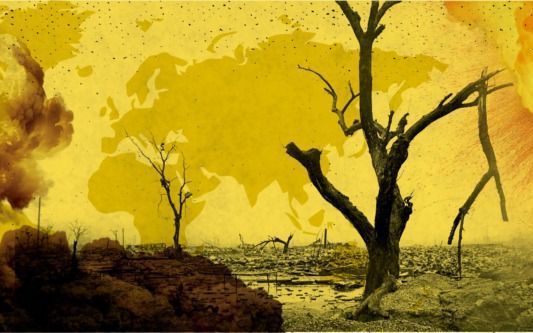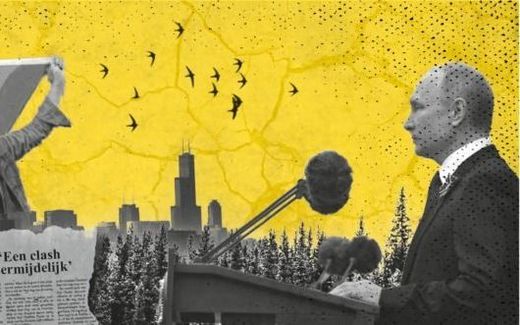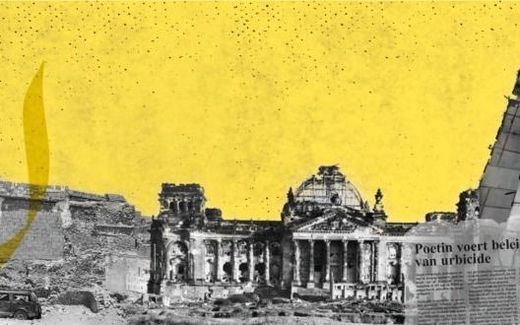Scared of the bomb that will wipe out history
21-10-2022
Opinion
Jacob Hoekman, RD

Photo RD
Opinion
Ecclesiastes says there is nothing new under the sun, but that does not mean there cannot be unique never-before-seen developments. One new development is undoubtedly the creation and use of nuclear weapons.
The top-secret Manhattan Project started in 1942 in the United States and would change the course of history. Scientists worked on a bomb that would not trigger a chemical chain reaction but use the energy stored in atomic nuclei.
That such a thing as an atomic nucleus exists at all was not long known at the time. In 1939, Albert Einstein wrote in a letter to US President Roosevelt that Adolf Hitler was planning to use the new nuclear science for a weapon of mass destruction, the atomic bomb. As a result, the Americans went all out to stay ahead of Hitler.
In the end, Hitler-Germany did not manage to develop an atomic bomb, but the Americans did succeed. The first nuclear explosion in world history, a test, occurred on 16 July 1945 in New Mexico. It was heavily charged with religious significance: the code name for the test was "Trinity". Trinity produced an explosion that far exceeded scientists' expectations. Its force was four times more violent than had been anticipated.
Was this weapon to be used in World War II? Doubts were high; after all, Hitler had already been defeated. But Japan still refused to surrender. That fact led to one of the most controversial ethical decisions in world history: the new bomb would be used to bring Japan to its knees. On 6 August 1945, "Little Boy" pulverised the Japanese city of Hiroshima; three days later, "Fat Man" reduced the city of Nagasaki to radioactive rubble.
So far, Little Boy and Fat Man are the only nuclear bombs that have actually been used against civilians. The enormous, irreversible consequences of using a nuclear bomb make any rational-thinking world leader wary of deploying this weapon.
Moreover, there is the mechanism of mutually assured destruction. Suppose one of the nine nuclear-armed countries deploys a bomb against another country with that weapon. In that case, there will be an immediate counterattack. Deployment of a nuclear bomb is, in that sense, equal to self-destruction.
Will that stop Russian President Putin, who is increasingly threatening to deploy nuclear weapons? It is highly unlikely that he would wipe a city like Kyiv off the map with a nuclear bomb. But deploying smaller, so-called tactical nuclear weapons on the battlefield is not at all out of the question. After all, these have a much smaller effect.
Yet, according to experts, even deploying such a tactical nuclear weapon poses a significant risk. Its problem would not even be the weapon as such but mainly the chain reaction it could set in motion. Russia and the United States together have the vast majority of all nuclear weapons on earth. That quantity is more than enough to destroy all life on earth.
That knowledge has come to define the work of German-Jewish philosopher Günther Anders, who died in 1992. Dutch philosopher Gertram Schaeffer quotes him in the latest issue of the magazine Sophie. Today we can single-handedly destroy the planet, according to Günther Anders. That means that our era should be seen as the end time - even if this era were to last a very long time. "When our era will go down, it will not pass into another era," he writes in his book "Hiroshima ist überall" ("Hiroshima is everywhere"). Because if total nuclear war becomes a reality, there will soon be no humanity left to write history.
According to Anders, that situation is hard to imagine. People already find it difficult to think about their own finiteness, let alone the finiteness of humanity as a whole.
It is precisely this unimaginability that he finds dangerous. According to Anders, there is only one remedy: as humanity, we should constantly imagine that very end so that we continuously fear it. Only by consciously feeding that fear, over and over again, it is possible, he believes, for this disaster of world proportions not to become a reality. In doing so, Anders outlines a situation that has become opposite to how God created the world. The ultimate remedy is no longer hope but fear.
The nuclear age has created more contradictions like that, as the very name of the first atomic explosion shows. The code name "Trinity", with its destructive power of death, is diametrically opposed to the Trinity with the Word That creates Life. The divine "creatio ex nihilo" -the creation out of nothing- becomes in human hands a "reductio ad nihil" -a reduction to nothing.
A Christian must find his way between these two opposites because they are both real.
In 1955, when the nuclear age was still very young, and the Cold War had only just begun, the Dutch pastor J. H. Velema already stressed the importance of taking both sides seriously. With the theologian Karl Barth, he urged his readers to keep the triumphant Christ before them. "In Moscow, the matter is not decided. Therefore do not live as if it is decided there." But against the statements of Karl Barth, he urged them not to underestimate Satanic powers either. "There is a battle to be fought. And in the light of that struggle, it may be necessary to wage war, even if we do not go along with all the views of those whose side we are on. Between East and West, unfortunately, the Church cannot be neutral."
That was in 1955. Indeed, there is apparently nothing new under the sun.
This article was translated by CNE.news and published by Dutch daily Reformatorisch Dagblad on October 19th, 2022.
Related Articles






